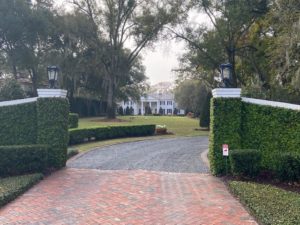Plantation life

At seven in the morning, barely dawn, the air is already warm and muggy. The only sound I hear as I run past the gated mansions of Winter Park, Florida, is that of leaf blowers. The only people I see are landscapers, crews of brown and black men. The mansion dwellers have not yet emerged to begin their days as one-percenters.
I have read the statistics on income inequality. I know that America’s top 10 percent averages more than nine times as much income as the bottom 90 percent. I know that Americans in the top 1 percent average over 40 times more income than the bottom 90 percent. And the gap has gotten progressively wider. Since 1979, the before-tax incomes of the top 1 percent of America’s households have increased more nearly seven times faster than bottom 20 percent incomes,
I am not ignorant of the life lived by rich people. I have been in homes that have 200-bottle wine cellars and wood-fired pizza ovens and bathrooms crafted from more Carrera marble than Leonardo used in a lifetime. I once gave a talk in a home where all the sinks were hand-thrown porcelain bowls, each hand-painted by a different Italian artist.
I am not ignorant of the lives lived by those on the margins today. At the Food for Lane County’s Dining Room I help serve a mid-day meal to as many as 300 hungry, often unhoused people. It is sometimes the only meal they will eat that day.
I run past those mansions, those 20,000 square-foot, 8-bathroom, porticoed, colonnaded residences sitting prettily on gorgeously landscaped half acres at the end of a gracefully curving flagstone driveways. And I catch a glimpse of the men, already sweaty as they prune trees and wheelbarrow mulch and blow palm fronds into neat piles. And I imagine their wives inside standing in front of $40,000 Wolf stoves fixing breakfast for the family in the mansion, or upstairs making the beds, or hurrying to put in the first load of laundry.
Maybe it’s that Tara look-alike mansion, or that much-older African American gentleman bent over at the curb sorting the family’s recyclables. Maybe it’s the sultry air, the cloying closeness of it. But all I can think of is Plantation Life, the plantation mentality. This isn’t history. This is today. We live in a country divided more completely, more brutality, more enduringly than what we are acknowledging at this particular political moment. We live in a country divided into the light-skinned ruling elite and the dark-skinned workers. America is a plantation.






2 comments
Lauren: I completely agree.
It so delights me that you found your way to my blog, Steve. Thanks for this.
Leave a Comment